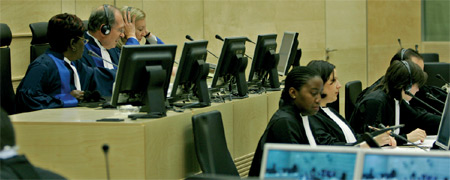
The International Criminal Court just issued an arrest warrant for President Omar al-Bashir on charges of war crimes and crimes against humanity. The ICC’s first indictment of a sitting head of state is likely to be a game changer, both globally and in Sudan. Globally, the ICC has served notice that the days of impunity from the world’s most heinous crimes are coming to an end. For Sudan, the indictment should ratchet up international pressure on Khartoum as well as weaken Bashir domestically.
The ICC is fulfilling the promise of its constituent document, the Rome Statute. It has not been politicized or used as an instrument of state power, as some had feared. It has not overstepped its bounds or mandate. By all accounts, it’s doing exactly what it was intended to do.
The reservations that some folks have about the indictment are well-intentioned, but ultimately off base. Khartoum has threatened retaliation against Darfuris, UN peacekeepers and other “ICC supporters.” Much of that can be prevented, though, by a strong response from the U.S. and others, especially on the Security Council. To this point, the Obama Administration has made all the right noises: quietly but unhesitatingly supporting the investigation and refusing to consider a 12-month deferral resolution in the Security Council. If Khartoum does incite violence in response to the indictments, the U.S. should clearly put the responsibility on the government and move quickly in the Security Council to expand targeted sanctions against individuals in the regime.
Franklin Graham, who has been deeply involved in peace work in Darfur, penned an op-ed in the NY Times yesterday opposing the indictment. Here’s where his argument goes off the rails:
For all his faults, Mr. Bashir has demonstrated that he is able to cooperate. On several occasions he has complied with my requests. When a hospital we operated in eastern Sudan was seized by government forces, Mr. Bashir granted us limited access. Mr. Bashir also made television time available for us to broadcast a Christian program at Christmas and Easter.
I doubt there is a single Head of State on the planet that can’t be “worked with,” at some level. That should be a clear lesson from the failings of the Bush Administration. First, implementing a peace deal and respecting human rights are a far cry from allowing access to a hospital Bashir took over (how reasonable!). But the question must not be whether Bashir is capable of dealing, or even of pragmatism. The question is whether or not the status quo is likely to produce a lasting peace. As Rev. Desmond Tutu points out in the same issue of the Times, the answer is a clear “no.”
In the medium- and long-term, the indictment will erode Bashir’s broad but thin support in the African Union. and the 105 State Parties to the ICC’s Rome Statute will be legally obligated to hand him over to the Court if he enters their respective jurisdiction, which will serve to severely isolate the Sudanese President. Now it’s up to the international community to understand how the game has changed and to play accordingly.
— Scott Paul
Update: For a different point of view from someone who understands ICC proceedings more clearly than I do, see Kevin Jon Heller’s post at Opinio Juris. While I agree it’s a huge disappointment that genocide charges weren’t included, I don’t see how the omission will lead to the political problems he suggests. The UN commission of inquiry’s failure to make a case for genocide four years ago didn’t cause the world to lose interest in Darfur and I doubt the Pre-Trial Chamber’s decision to omit genocide charges will either.


13 comments on “ICC Issues Arrest Warrant for Bashir”